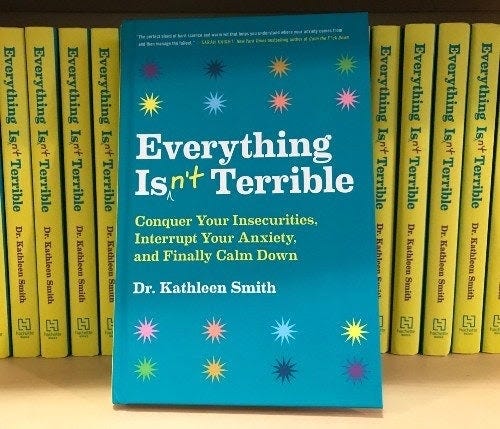Continued thanks to everyone who has updated to a paid subscription, shared this newsletter with others, or sent encouraging words. I continue to be grateful to get to work on this newsletter every week, and your support helps me do that! - K
A few nights ago, my husband struggled to fall asleep. I heard him go downstairs, and after a few minutes of lying awake, I went down to find him watching a TV show. “What are you doing?” I asked. “Looking at a screen is going to make it harder for you to fall asleep.”
I caught myself as soon as I said it. “I’m sorry. I know you’re in charge of yourself,” I said with all sincerity as I went back upstairs.
In moments like this, I try to see the science behind my behavior. Because our stuck-togetherness as humans, our desire to have others do as we do, to solve problems the way we would solve them, is both a feature and a bug. Imagine if you never felt any pressure to direct others, or be directed. Groups wouldn’t work so well.
But sometimes there can be a little too much “togetherness” in your relationships. Humans respond to this force in a few predictable ways.
You spend a lot of energy trying to get others to change.
You give in to the pressure to change, giving up “self.”
You distance from the relationship.
So often people try and overhaul the relationship, or the whole system, rather than tinkering with their part in it. Lost in the togetherness, it’s easy to “We” your way through life, when a simple focus on I, on self, will do.
Need some examples?
Telling your family, “We need to make healthier choices.”
Telling a group, “We need to be more responsible/organized.”
Saying to your partner, “It’s late! We need to go to bed.”
Trying to haul the entire family to therapy with you.
Hiring a consultant for the organization before thinking about your own functioning in it.
Using “We” when talking about something your child did.
I wouldn’t call any of these behaviors bad. But when you’re “We-ing,” it’s easier to act as if your own functioning is completely reliant on what others are doing. You lose respect the individuality of others. As well as your own.
High togetherness in a group can also look like:
Becoming over-responsible for others easily.
Quick adopting the beliefs of others.
Lots of distance or cutoff in relationships.
Needing closeness, but feeling allergic to it.
A lack of tolerance for differences in thinking.
Lots of focus on whether people like you or are annoyed with you.
Basing decisions on how others will react.
A focus on keeping things calm, rather than solving problems/meeting goals.
Your exercise: When have you “WE-ed” your way through challenges? Challenges that could have benefited from a stronger focus on self? When have you treated a group of people like a giant blob, and not a gathering of individuals? What are the relationships or groups where this is easiest to do? (Hint: The higher the anxiety, the more automatic it will be).
Your assignment: Pick a single day, and make a note of your observations on the togetherness force. When are you communicating to others (verbally or nonverbally), “Do as I do?” When are you giving in to this pressure from others? The goal isn’t to avoid any cooperation—it’s simply to make sure that it’s a thoughtful agreement, rather than an automatic, anxious one.
Holding on yourself in relationships is one of life’s great challenges. Sometimes you’ll pull this off brilliantly, while other times, like me, you’ll overreach and have to march back up the stairs to bed. My hope for myself is that I can be curious about this tension between individuality and togetherness, respecting the need for both as a human.
News from Kathleen
Two new podcast interviews are up!
I was thrilled to get a chance to talk with physician and mom Sarah Hart-Unger on her podcast with Laura Vanderkam, Best of Both Worlds. We talked about about families, work, and managing anxiety when the world is on fire. Give it a listen on Apple, Spotify, or wherever you listen to podcasts.
I was also thrilled to connect with fellow systems thinker Steve Cuss on his podcast, Managing Leadership Anxiety. We chatted about today’s dating world (and how I help clients think about dating), Bowen theory, and more. Give it a listen on Apple, Spotify, or wherever you listen to podcasts.
How to support my work:
Turn on paid subscriptions, to get weekly emails (rather than twice a month).
Leave a review of my book on Amazon. Reviews help people find the book.
Forward or share this newsletter to others who might be interested.
Want to read more of my writing? Get my book, Everything Isn't Terrible, from Amazon, Barnes and Noble, or your local bookstore (best option).
Want a free anxiety journal with the book? Calming Down & Growing Up: A 30 Day Anxiety Journal includes thirty daily prompts to help you reflect on and respond to your anxious behaviors. To receive a copy, just email me your receipt of Everything Isn’t Terrible.
Email me if you’re interested in Bowen theory coaching or want me to speak to your group or workplace. Follow me on Twitter, Facebook, or Instagram.
Want to learn more about Bowen theory? Visit the Bowen Center’s website to learn more about their conferences and training programs.






This article really resonates with me. My husband and two kids have adhd. I don’t. It can be very tricky to figure out how to be helpful and yet respectful of their choices.
And not let the lines of responsibility get all blurry. I constantly have to re-examine my position- which is tiring. And sometimes feels like an impossible balance. It is easy to get lost in over functioning when someone you love is floundering.